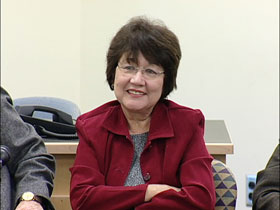  |
| HOME | THIS ISSUE | CALENDAR | GRANTS | BACK ISSUES | < BACK | NEXT > |
Retired faculty share experiences, tips for success in classroomby Elizabeth Omara-Otunnu - October 30, 2006 |
||||||||
|
Exams are as important for professors as they are for students. Time management is vital for optimal studying. Student evaluations really are worthwhile. Those were some of the insights provided by eight retired faculty members who returned to campus Oct. 20 to discuss what they had learned during their careers - about teaching, about their students, and about themselves. The panelists, each with many years' teaching experience, shared their "best of times, worst of times" with an audience of faculty and teaching assistants. The panel was organized by the Institute for Teaching and Learning. Derek Allinson, emeritus professor of plant science, described the satisfaction of seeing understanding and learning taking place in class. "It is one of the rewards of teaching . and was very important in keeping me teaching so long," said Allinson, who taught at UConn for 32 years. He said his "worst of times" occurred when a student in a lab got pepper seed in her eye, and he feared she was going to go blind. "She didn't," he said, "but it taught me a good lesson to be very careful about what I did in labs." Kent Newmyer, an emeritus professor who specializes in constitutional and legal history, recalled a student who took one of his courses in the 1960s. She was very shy in class, but one day he spotted her carrying a placard during an anti-war protest at Hawley Armory. "It struck me, she was there - why wasn't I?" said Newmyer, who had encouraged his students to be involved. "I said to her, 'You were there,' and she replied, 'That's what you taught me.'" Joan Hall, professor of English emerita, said one of her worst experiences happened when a technique that usually worked well backfired. She used to read out excerpts from the best student papers and hold them up as models. Early in her career, in the mid-1950s, she read aloud from a particularly well written essay about adjusting to college life. The student described how uncomfortable she'd been made to feel holding hands with another woman on campus. "I read it to the class and handed it back to her," Hall said. "I didn't realize until later that I had 'outed' her to the class." Almost all the panelists had something to say about exams. Dick Reynolds, associate professor emeritus of English, said he found quizzes encourage students to study and boost attendance. After introducing Friday morning quizzes for 80 percent of the course grade, attendance on Fridays increased significantly, he said. Tom Terry, associate professor emeritus of molecular and cell biology, said exams are crucial for providing feedback to the professor. "We have to see what our students are getting, and what they are not," he said. He said it is important to devise good exams with well-worded questions. Despite skepticism about individual student evaluations of faculty, the issues that come up year after year can provide valuable insights, said Allinson. Taking to heart his student evaluations, he tried to make himself more approachable by arriving at class 15 or 20 minutes early. He talked to students as they came in, and also stayed after class.
That way, he said, the students were more willing to consult him about their problems. Asked for tips on how to engage students, Terry spoke about the research projects he introduced for the second half of a microbiology course. Students developed their own projects, using the basic microbiology techniques they had just learned. "A lot of students got really engaged," he said. Two of his students did a microbiology survey of an ambulance. They found that many parts of the vehicle were contaminated with the bacterium staphylococcus aureus. After presenting their results to the ambulance company, they were invited to design strategies to make ambulances safer. "The students were proud they could do something useful with what they learned in class," he said. Terry Webster, professor emeritus of ecology and evolutionary biology, said he tried to create an "aura of anticipation" by introducing the "Golden Ginkgo Award." Once a week, he would offer a seedling of the ornamental Ginkgo tree for the best answer to an open-ended question. "The students really got into this," he said.
Cecile Hurley, a retired lecturer in chemistry, said that many students don't know how to study. When individual students were struggling, she would ask them, "'Tell me how you study.' Invariably it's the wrong way to study," she said. She would tell them to keep a time schedule for 10 days and then come back. "A lot of students are frittering their time away," she said. "If they have a class at 9 and another at 1, they think 10 to 1 is free. . Their biggest problem is time management." Robert Bee, emeritus professor of anthropology, said professors must be organized too. "Students crave organization in many contexts," he said. Bee also advised faculty to "let [students] see you as a human being. They appreciate anecdotes about your past that are relevant." Several panelists spoke about the importance of being enthusiastic in class. Said Newmyer, "When you're looking out at a crowd of students, you know that you're not going to resonate with all of them, but you don't know which ones you can save and which you can't," he said. "Teach every single one of them as if you can reach them." |
||||||||
| ADVANCE HOME UCONN HOME |


